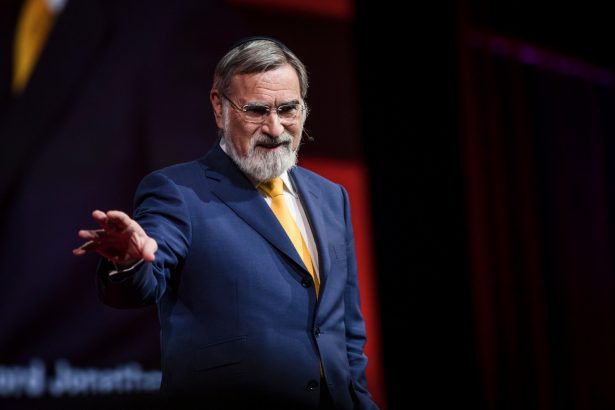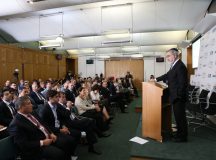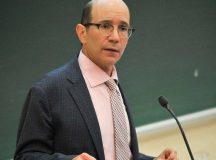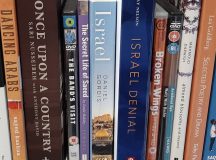Lord Rabbi Jonathan Sacks was a good friend to this journal, meeting with its editor when it was only an idea, to advise and to encourage. Michael Wegier, a former chief executive of The United Jewish Israel Appeal (UJIA), pays tribute here to ‘a phenomenal Rabbi and educator with a profound moral message’, focusing on Rabbi Sacks’ statements on the Jewish State. Michael is the newest member of the Fathom advisory editorial board.
A couple of weeks ago, Alan Johnson, the Fathom editor asked me if I would write a short tribute to the memory of former British Chief Rabbi, Lord Jonathan Sacks who sadly passed away last month. I noticed that only a few of the obituaries and reflections that were published related to his thoughts on Israel, and so Fathom is the ideal place in which to consider his perspective on the Jewish State.
Rabbi Sacks was profoundly invested in Israel both as the expression of sovereignty for the Jewish people in their historic land and also as a source of rejuvenation and inspiration for Jewry world-wide. Alongside this commitment, he also had concerns about Israel’s direction in two distinct but related areas that I shall touch upon shortly. Appreciating this nuanced approach to Israel in Rabbi Sacks’ life and work is an essential dimension in understanding his overall world view.
Many recent posts about Rabbi Sack’s life tried to summarise his intellectual contribution. I am grateful to Professor Daniel Rynhold of Yeshiva University (Formerly of London) who in his Jewish Chronicle tribute, pointed to a line from Rabbi Sacks’ Radical Then, Radical Now (2000) which states a clear ideological position on Judaism that is equally pertinent to his views regarding Israel. Judaism, Sacks wrote, ‘is not a way of understanding or accepting or being reconciled to the world. To the contrary, it is a protest against the world that is, in the name of the world that ought to be.’
As for a great many young Diaspora Jews, the Six-Day War of 1967 was a critical moment in Rabbi Sacks’ life. He visited the Mount of Olives in Jerusalem in the late 1960s, reflecting just a few months ago that it was ‘almost the most mystical experience of my life.’ Thinking about the ancient Rabbis who witnessed the destruction of Jerusalem in 70 CE, he wanted to ask Rabbi Akiva if he would have continued to believe if he’d known it would take almost 2000 years until this moment. Answering in Akiva’s name in the affirmative, Rabbi Sacks linked hope, faith and the return to Jerusalem as vital elements in the Jewish people’s survival – ‘Hope rebuilds the ruins of Jerusalem. The Jewish people kept hope alive and hope kept the Jewish people alive.’ (9th Av Fast Day sermon July 2020)
This quotation, and countless others in Rabbi Sacks’ books, sermons and weekly Torah essays, all testify to the strength of his passion for Israel and its place in both Jewish destiny and the lives of Jews worldwide. Equally important however is to appreciate that Rabbi Sacks did not understand the rebirth of Israel in 1948 or the reunification of Jerusalem in 1967 in Messianic terms. In the early years of Zionism at the end of the 19th Century, many Orthodox Jews were either hostile or at best neutral about Zionism. They were concerned for two reasons. Firstly, the majority of Zionist pioneers to Palestine were ideologically secular and even hostile to religion. Secondly, they were influenced by a Rabbinical perspective of not creating a new Jewish commonwealth until God decided to send the Messiah. However, an important minority of Orthodox Jews were Zionist and in time, became a very considerable force within Israeli society.
This point is vital. Much of the Israeli National Religious community and its supporters overseas saw the establishment of Israel as the first part of the Messianic era. The new State recognised that many religious Jews (but not ultra-orthodox ones) would strongly identify with the secular state and seek to add a layer of religious meaning to its creation. Their representatives were participants in all of the governments of Israel since 1948 and notwithstanding the break ups and make ups of Israeli politics, continue to wield significant influence through various political groupings.
One important way in which this Orthodox Zionist world view expressed itself was through the expression ‘The beginning of the flowering of our redemption’ which made it into the official prayer books of the National Religious communities throughout Israel and in many communities around the Jewish world. After the Six-Day War in 1967, the Settler Movement known as Gush Emunim ‘Block of the Faithful’ was explicit about the between Israel and Messianic redemption.
Rabbi Sacks was more circumspect: ‘The extremely boring but nonetheless not bad view of Chief Rabbis of Great Britain – the late Sir Israel Brodie, the late Lord Jakobovitz and myself – all of whom have mandated forms of prayer for the State of Israel which do not contain the phrase rayshit smichat ge’ulataynu – which see Israel as religiously significant but about which we are not yet ready to say that it is of Messianic significance.’ (Faith lectures 2001)
This position put Rabbi Sacks out of sync with the National Religious (Modern Orthodox) community in Israel and might account for the fact that it was only in more recent years as his stature and celebrity grew that his name became better known in Israel. The Hebrew language coverage of his death was considerable in both general media and the Orthodox communal institutions and this growth of his influence is likely to be accelerated and developed further.
Notwithstanding the reluctance to identify Israel with Messianism, Rabbi Sacks did not downplay at all the importance of Zionism and Israel for the whole Jewish people, wherever they may live. His writings and sermons draw upon the biblical-prophetic tradition as well as the harsh realities of modern antisemitism, to express the significance of Israel for world Jewry and its responsibility to be beacon to Jewry and the world at large.
He understood that the expression of Jewish sovereignty through a nation-state was a necessity for the Jewish people in a post Holocaust world. He lauded the opportunities created by sovereignty with regards to the creation of a Jewish public space. The creation of a dynamic spoken language, a renewed cultural life, a strong economy and many extraordinary achievements in science and technology were a source of wonder to Rabbi Sacks and he saw their potential both within Israel itself and as a source of inspiration for young Jews world-wide. He recognised that the pace with which this has all been achieved is remarkable but was careful to draw our attention away from seeing it of redemptive significance. Rather, the ‘power’ of the Israel narrative was drawn from the Jewish Peoples’ connection to the biblical narrative, the daily liturgy regarding the Land of Israel and his reading of Jewish history and the Jewish people’s vulnerability.
Throughout his career as a Rabbi, he actively promoted Israel education, and both short and long-term Israel trips. To his enormous credit, he did not limit this advocacy to Orthodox programmes only. He saw tremendous value in young people spending significant time in Israel on programmes of all ideological perspective. He understood and appreciated the power that a significant Israel experience could have on a young person’s identity and commitment to Judaism, the Jewish people and Israel.
The influence of the ideology of Gush Emunim led to the development of an extensive network of settlements in Judea and Samaria – the ‘Occupied Territories’ – which provoked both violent and political backlash in the territories, in Israel generally and overseas. Rabbi Sacks’ predecessor Lord Jakobovits had criticised the Settler Movement during his own tenure and incurred the wrath of Israel’s then Chief Rabbi Shlomo Goren who even called for his excommunication.
In an interview with the Guardian’s Jonathan Freedland in August 2002, Rabbi Sacks went in a similar direction. He said ‘I regard the current situation as nothing less than tragic. It is forcing Israel into postures that are incompatible in the long run with our deepest ideals.’ The interview took place during the 2nd Intifada-Palestinian Uprising (2000-2005) when violent actions and reactions were galvanising all sides. In the same week (2002) Freedland noted that Rabbi Sacks stated that in 1967 he was “convinced that Israel had to give back all the [newly-gained] land for the sake of peace” – and he does not renounce that view now.’ (ie 2002)
The 2002 interview caused a great deal of ‘noise’ with voices raised in opposition and support from people in Israel and the UK based on their own political persuasion. At the time, it struck me that whatever the wisdom of a Chief Rabbi speaking out on politics, his view was entirely consistent with his position that Israel’s existence is not known to be part of a great Messianic process. It also seemed entirely in accord with the quote from Radical, Then Radical Now which I referenced at the beginning of this article of seeing Israel – as Judaism’s expression of sovereignty – as a call to itself to live up to its own moral standards.
Rabbi Sacks was not naïve about the Palestinian leadership or its supporters around the world. He was deeply frustrated by their refusal to bring peace talks to a lasting conclusion. He understood the need for a strong IDF even if he had concerns about some of its soldiers’ actions. He understood that there are Palestinians seeking Israel’s demise and that some of their supporters in the UK and elsewhere exploit the Palestinian issue to demonise Israel and Jews, often using classic antisemitic motifs. This however was not for Rabbi Sacks a good enough reason to remain silent on unsavoury aspects of Israel’s behaviour at that time.
As the 21st century progressed, Rabbi Sacks, like most Jews, became increasingly concerned that criticism of Israel (in the English speaking world) was slipping too frequently into antisemitic discourses and to my knowledge he did not go public again on his criticism of the IDF or the settlement movement.
It is equally important to consider Rabbi Sack’s deeply felt concerns about where secularism was taking younger Israelis. It is well understood that among Rabbi Sacks’ greatest achievements as Chief Rabbi was the flourishing of Jewish education initiatives in the UK. His Will we Have Jewish Grandchildren? (1994) provided the backdrop for much of this important work.
In a conversation with the preeminent Israeli novelist Amos OZ at Bar Ilan University, the two of them discussed Israel in a dialogue published as Israel: Dreams and Reality (2001). As part of a wide-ranging conversation, Rabbi Sacks reflected on the lack of knowledge that young Israelis had about Jewish tradition. Their parents and grandparents had in many cases been products of the Yeshiva world, steeped in Jewish learning. However, their transition to Zionism (Jewish nationalism) had also been a journey away from traditional Judaism. So now a few decades later, the young Israelis are unable with intellectual integrity to reject a tradition about which they know so little. Rabbi Sacks lamented at their inability to name the five Books of Moses, the ten Commandments, the three patriarchs and the four matriarchs.
Oz acknowledged the criticism but responded forcefully that Diaspora Jews, are unable to follow what happens and what is produced in Israel unless it is translated into their own language. The loss of Hebrew in the Diaspora is no less a challenge for Jewish continuity than the distance of young Israelis from the religious tradition, said Oz. Rabbi Sacks accepted the point and confessed that he did not know why it was so difficult in the UK to get schools to teach Hebrew to a high level.
In 2015, as Chief Executive of UJIA, I had the honour of joining Rabbi Sacks at the Netiv Tfachot Yeshiva (Talmudic academy for young men) in the centre of the Galilee where a new study hall was being dedicated in his honour. As expected, Rabbi Sacks spoke beautifully about the work of the Yeshiva with young men from very modest backgrounds, but what sticks most in my mind as I recall that visit, is not the intellectual or spiritual depth of his words, but his dancing with the students. Rabbi Sack’s understood that when it comes to Judaism or Israel or indeed any great moral issue, there are times to philosophise and teach, and there are times when it is necessary and more educative to just dance.
The world has lost a phenomenal Rabbi/educator with a profound moral message. Israel was not always at the front and centre of an encounter with Rabbi Sacks. But on those occasions when he addressed the subject in speeches, writings and sermons he urged Jews and others to engage deeply with Israel. To allow it to inspire us and for us to work with Israel become the fulfilment of the prophetic tradition.




































